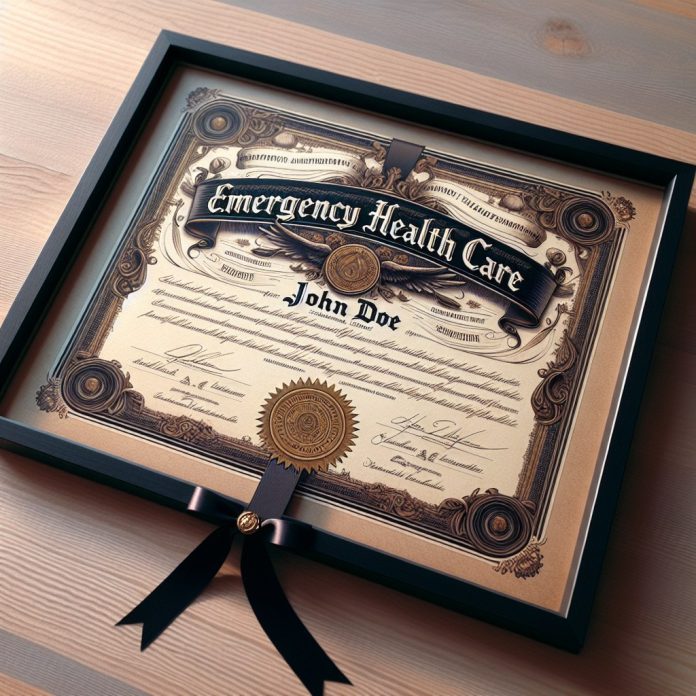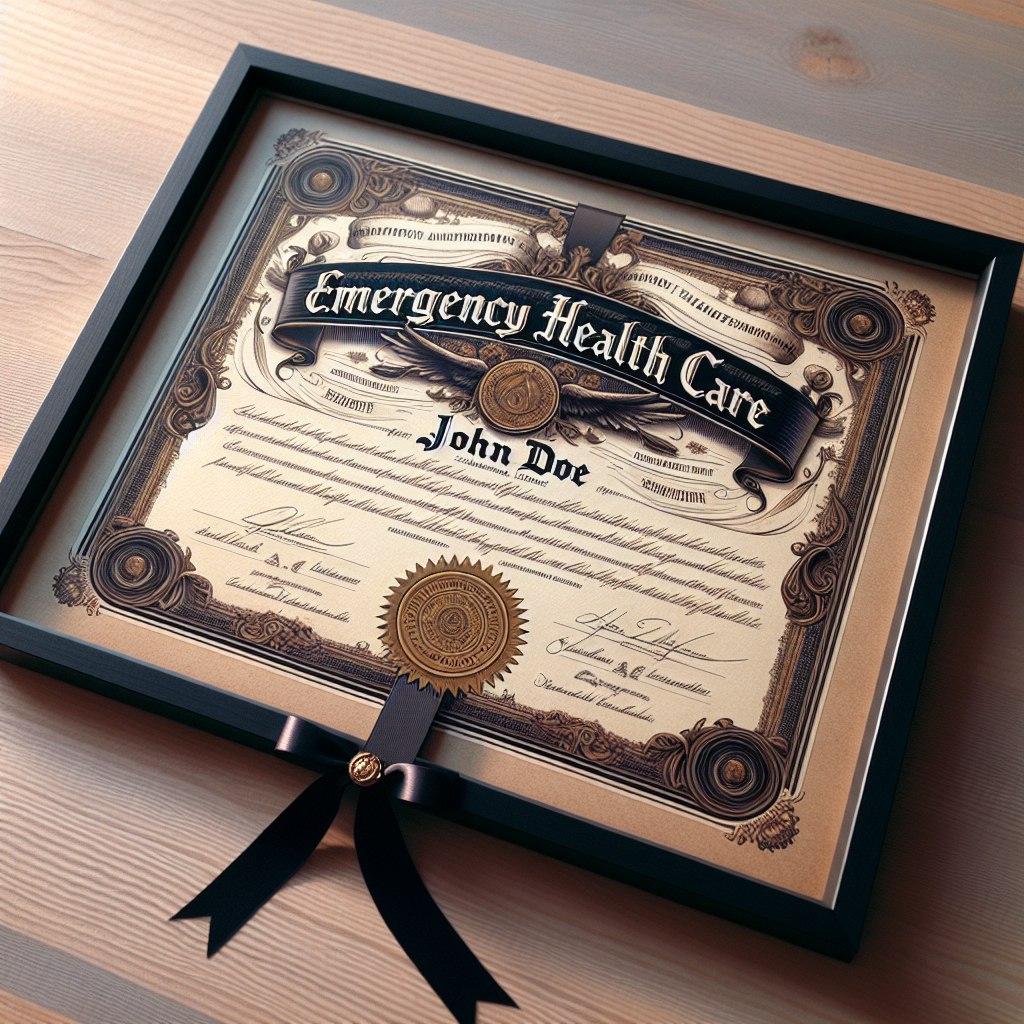
Exploring the Diploma of Emergency Health Care: A Comprehensive Guide
In the fast-paced world of healthcare, emergency services play a crucial role in saving lives and providing immediate care to those in critical situations. For individuals passionate about making a difference in emergency settings, obtaining a “Diploma of Emergency Health Care” is a significant step. This article delves into the details of this diploma, its benefits, career prospects, and why it is an essential qualification for aspiring healthcare professionals.
What is a Diploma of Emergency Health Care?
📘 Definition: A Diploma of Emergency Health Care is a specialized educational program designed to equip students with the knowledge and skills required to provide high-quality care in emergency situations. This diploma covers various aspects of emergency medical services, including patient assessment, first aid, and advanced life support techniques.
Why Pursue a Diploma of Emergency Health Care?
Career Opportunities
🚑 Diverse Roles: Graduates with a Diploma of Emergency Health Care can pursue various career paths in the healthcare sector. They can work as emergency medical technicians (EMTs), paramedics, emergency room assistants, and other critical roles in hospitals, clinics, and ambulance services.
High Demand for Emergency Healthcare Professionals
📈 Growing Need: The demand for skilled emergency healthcare professionals is on the rise due to increasing medical emergencies and the need for immediate care. This diploma opens doors to numerous job opportunities in a field that is both challenging and rewarding.
Skill Development
🛠️ Comprehensive Training: The diploma program provides extensive training in emergency medical care, including handling trauma, administering medication, and performing life-saving procedures. These skills are invaluable in emergency medical settings.
Curriculum of a Diploma of Emergency Health Care
Core Subjects
📚 Fundamental Courses: The curriculum typically includes core subjects such as human anatomy, physiology, emergency medical procedures, patient assessment, and medical terminology. These foundational courses provide the essential knowledge required for effective emergency care.
Advanced Training
💉 Specialized Skills: Students also receive advanced training in areas like advanced cardiac life support (ACLS), pediatric emergency care, trauma management, and pharmacology. These advanced courses enhance the student’s ability to handle complex medical emergencies.
Practical Experience
🩺 Hands-On Training: Practical experience is a crucial component of the diploma program. Students participate in clinical placements, simulations, and real-life scenarios to apply their theoretical knowledge and develop hands-on skills in emergency care.
Benefits of a Diploma of Emergency Health Care
Enhanced Employability
👨⚕️ Competitive Edge: Having a Diploma of Emergency Health Care significantly enhances employability. Employers value the specialized training and skills that come with this qualification, making graduates highly sought after in the job market.
Personal Fulfillment
🌟 Making a Difference: Working in emergency health care is incredibly fulfilling. Professionals in this field make a direct impact on patients’ lives, providing critical care when it is needed most. This sense of fulfillment is a significant motivator for many individuals in the healthcare sector.
Professional Growth
📈 Career Advancement: This diploma can also serve as a stepping stone for further education and career advancement. Graduates can pursue higher qualifications, such as a bachelor’s degree in emergency health care or related fields, leading to more advanced and specialized roles.

Career Paths with a Diploma of Emergency Health Care
Emergency Medical Technician (EMT)
🚑 First Responders: EMTs are often the first responders in emergency situations. They provide basic life support, stabilize patients, and transport them to medical facilities. This role requires quick thinking and the ability to handle high-pressure situations.
Paramedic
💼 Advanced Care: Paramedics provide advanced medical care, including administering medications, performing advanced airway management, and handling severe trauma cases. This role requires additional training and certification beyond the basic EMT level.
Emergency Room Assistant
🏥 Hospital Support: Emergency room assistants work in hospitals, supporting doctors and nurses in emergency departments. They assist with patient care, perform basic medical procedures, and help manage the fast-paced environment of an emergency room.
Specialized Emergency Roles
🚒 Niche Areas: Graduates can also pursue specialized roles in emergency health care, such as working in disaster response teams, air ambulance services, or specialized trauma units. These roles require specific skills and training, often provided through additional certifications.
Accreditation and Certification
Importance of Accreditation
🏅 Quality Assurance: It is crucial to choose a diploma program that is accredited by recognized health care and educational bodies. Accreditation ensures that the program meets high standards of education and training, providing students with the skills needed to excel in emergency health care.
Certification Requirements
📝 Credentialing: After completing the diploma, graduates must obtain certification from relevant authorities to practice as emergency health care professionals. Certification processes vary by region and role, but they typically involve passing a comprehensive exam and meeting clinical experience requirements.
How to Choose the Right Program
Research and Comparison
🔍 Thorough Investigation: Prospective students should research and compare different diploma programs to find one that best meets their needs. Factors to consider include the curriculum, accreditation status, faculty qualifications, and the availability of practical training opportunities.
Program Reputation
⭐ Student Reviews: Looking at program reviews and testimonials from former students can provide valuable insights into the quality of education and training provided. Programs with high success rates and positive feedback are often the best choices.
Support Services
🎓 Student Resources: Good diploma programs offer robust support services, including academic advising, career counseling, and access to clinical placement opportunities. These resources can significantly enhance the learning experience and career prospects of students.
Conclusion
The Diploma of Emergency Health Care is a vital qualification for individuals aspiring to work in emergency medical services. This diploma provides comprehensive training, equipping students with the knowledge and skills necessary to excel in high-pressure emergency settings. With increasing demand for skilled emergency healthcare professionals, this diploma opens doors to a wide range of rewarding career opportunities. By choosing an accredited program and obtaining the necessary certification, graduates can embark on a fulfilling career dedicated to saving lives and providing critical care when it is needed most. Whether you aim to become an EMT, paramedic, or emergency room assistant, a Diploma of Emergency Health Care is your gateway to a dynamic and impactful career in the healthcare industry.



















